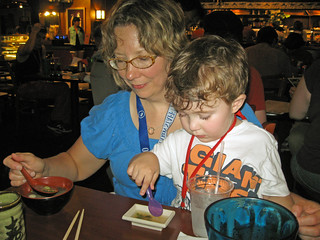Everywhere you look, magazines, TV ads and billboards extol the virtues of youth. We should all lament growing older, these voices tell us. For sure, we should attempt to erase any signs of the toll the years have paid on our bodies.
Here’s a shocking idea: Growing older isn’t just an inevitable fall into decline. Growing older actually has some advantages. As an older mom, I’ve discovered quite a few.
Now to be sure, there are some negatives, and since they’re the ones that people usually focus on, let’s get them out of the way quickly.
As an older mom (and medical practitioners define this as 35 years and older), you’ll be classified as a high-risk pregnancy and will be urged to take a battery of stress-inducing tests to ensure the health of your baby. Discuss those options carefully with your obstetrician and your network of support and decide if the information they can provide will be worthwhile.
As an older mom, who is considered high-risk, you will be unlikely to have as many birthing options. While it’s not impossible to find ob-gyns and midwives who will work with you, if you’re giving birth for the first time, you’ll most likely be encouraged to have the baby in a traditional hospital setting, with all of the monitors possible. Of course, this is a small price to pay for a healthy baby, as I think we’d all agree.
You might find that your resilience and healing process are slower than they would be for younger women. This can mean healing from the birth as well as losing baby weight.
If you’re an older adoptive mom, the previous points won’t apply to you, but the rest will. As an older mom, you might have a harder time dealing with the erratic schedule that your child brings. If, like me, you’ve been accumulating aches and pains since your 20s, it might be harder to get down on the carpet and play for extended periods of time.
And of course, as an older mom, you’ll have to put up with misguided comments: everything from people asking you if you’re the grandma to rude personal questions about whether you’re going to have another child and why you waited so long. Having talked to moms who started earlier, though, I can tell you that you’re not alone. Nothing brings out the nosiness in neighbors and strangers, it seems, quite like being a mom. Younger mothers also deal with invasive questions: just different ones.
Now for the positives, and there are plenty.
You have experience and perspective that younger mothers may lack. While you may not have personally been a mother until now, chances are you’ve watched from the sidelines as friends and family members raised their children. You may have been taking silent notes on what parenting practices you would want to adopt, and you’ve been in a unique position to benefit from watching their mistakes and successes.
Plus, you’ve gained life experience that younger mothers haven’t had. Many older moms start later because of having focused for years on their career or on hobbies. Chances are, you’ve got enough experience in your field to be able to make intelligent choices when it comes to whether you want to balance work and career or simply take some time to focus on family. Coming at motherhood later, you’re less likely to feel as if you got sidetracked by motherhood before you ever got a chance to see what you might achieve.
In addition, you’ve probably built a network of coworkers and friends who can provide you with a broad variety of perspectives and support.
While it’s not true for everyone, many older moms are more financially secure than they were in their younger years. That can help alleviate some of the stress produced by all those new bills for everything from pediatrician visits to diapers, clothes, and baby food.
You have lived longer and had more time to gain the sort of useful knowledge that will benefit your child. Kids are little sponges: they’ll appreciate it.
I’m sure there are many other benefits, as well, but this is a good start to consider, whenever you start to doubt yourself. Celebrate yourself and all you have to offer.
What other advantages do you think go along with being an older mom? Share them in the comments.

